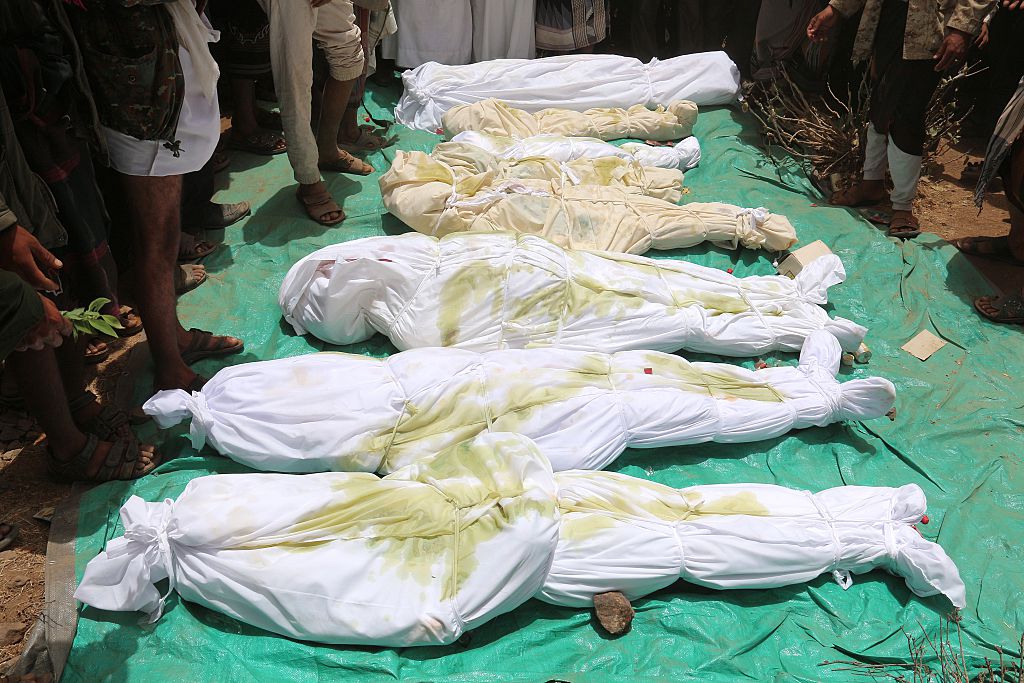Spain maintains war in Yemen
Iberia and Airbus secretly profit from Saudi bombing campaign in Yemen
European arms have played a significant role in virtually every major conflict across the globe. Our investigation documents the part Spain has played in this game of power and profit, approving licences for the export of arms to countries including Saudi Arabia, Morocco, and Nicaragua, and how those weapons have been used to facilitate oppressive regimes and violate human rights.
Among other findings, the investigation determined the sale by Airbus of half a dozen Spanish A330 MRTT refueling tankers to the Saudi air force. We gathered, and verified, evidence on how these tankers support bombing missions in Yemen. We also discovered that some of these Saudi planes regularly return to Iberia’s plant in La Muñoza for maintenance. All this in clear violation of the European Union regulations and Spanish law. Among our most compelling findings was visual evidence of an A330 MRTT tanker aircraft flying to Yemen to refuel Saudi jets.
METHODS
The investigation was carried out by a team of journalists using the latest in open-source intelligence methods for journalists and civil society for which they received specialist training from Lighthouse. Participants made immediate use of the new skills and tools to sift through data and scour social media for evidence of Spain’s export tactics. Geolocation and chronolocation techniques helped us corroborate evidence of obvious or potential breaches of European regulations governing arms sales.
The A330 MRTT tanker aircraft that we determined had been refuelling Saudi jets is a case in point. The plane originally had a civilian configuration but was converted by Spanish carrier Iberia into a military refuelling jet. We were able to geolocate such planes flying into La Munoza, near Madrid, where Iberia’s plant is located. Information gleaned from job advertisements and LinkedIn profiles provided additional proof that the converted Saudi planes were returning to Spain for maintenance.
STORYLINES
Spain’s arms industry has been going from strength to strength with exports skyrocketing to €4.3 billion in 2017 from €933 million in 2007. As a result of these record-breaking sales, Spain ranked 7th in a list of the world’s top arms exporters between 2014 and 2018.
Exporting arms comes with commitments which are not necessarily being honoured. The EU’s legally-binding Common Position on arms sales is aimed at regulating “responsible” arms exports. Member states exporting to countries that “use the military technology or equipment (…) aggressively against another country” should not be granted an export license, the regulation stipulates.
The Saudi air campaign against Yemen is a clear example of arms being used “aggressively against another country,” in contravention of the EU’s Common Position on arms exports. Saudi airstrikes have wreaked widespread deaths and destruction, razing hospitals, homes and schools along with the country’s cultural heritage, according to the Yemeni NGO Mwatana.
Yet, as the devastating war in Yemen continues, Spanish companies are maintaining the planes of the Royal Saudi Air Force fleet.
When our findings were published, Amnesty International, Oxfam and Greenpeace called on the Spanish government to conduct an investigation into irregular arms exports.
A few months later a Spanish NGO backed a request by the European Center for Constitutional and Human Rights ) to the International Criminal Court to investigate exports of military equipment being sold by European companies to #Saudi Arabia and its ally in the #Yemen war, the United Arab Emirates #UAE. As suppliers of arms they are responsible for war crimes, the NGOs claim.
Our research was crucial in providing data and evidence to corroborate claims lodged with the ICC and to demand accountability, said Pol Pareja, a journalist at El Diario.
During the same investigation, we gathered evidence of Turkish military campaigns in Syria and Cyprus supported by EU-made and -maintained A400M military transport airplanes. . Other findings include the illegal export by the Spanish company Rodman of military vessels to Morocco and the use of Spanish ammunition against protesters in Nicaragua.
To keep up to date with Lighthouse investigations sign up for our monthly newsletter
The Impact
Our investigations don’t end when we publish a story with media partners. Reaching big public audiences is an important step but these investigations have an after life which we both track and take part in. Our work can lead to swift results from court cases to resignations, it can also have a slow-burn impact from public campaigns to political debates or community actions. Where appropriate we want to be part of the conversations that investigative journalism contributes to and to make a difference on the topics we cover. Check back here in the coming months for an update on how this work is having an impact.



